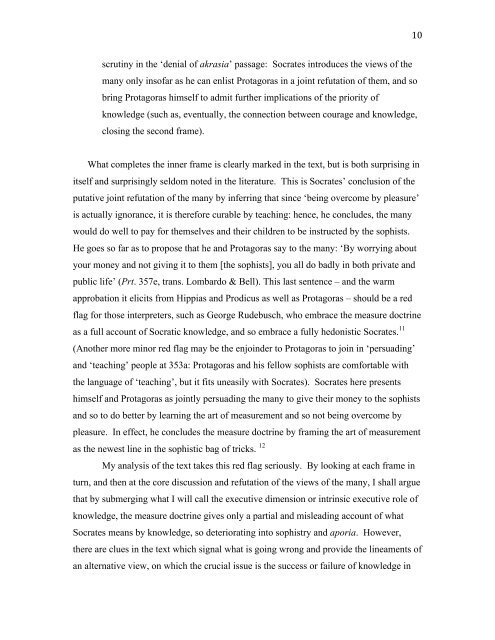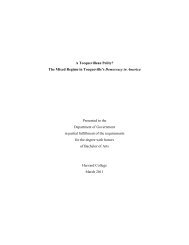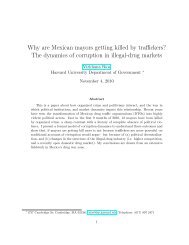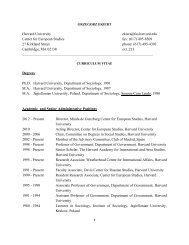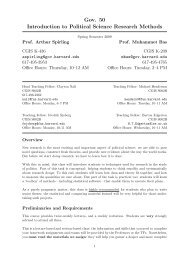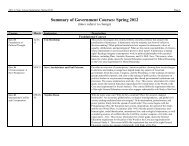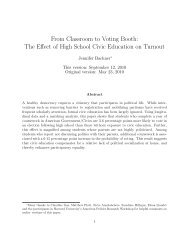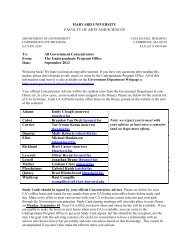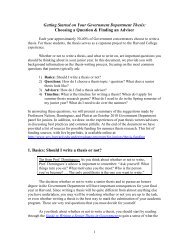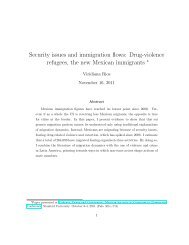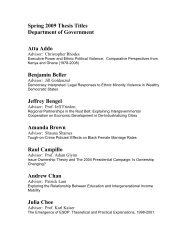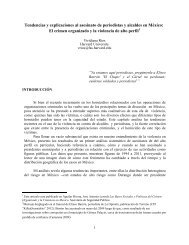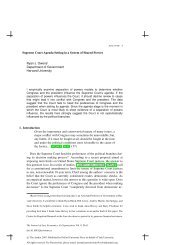1 Harvard University Political Theory Colloquium For 11 March 2010 ...
1 Harvard University Political Theory Colloquium For 11 March 2010 ...
1 Harvard University Political Theory Colloquium For 11 March 2010 ...
Create successful ePaper yourself
Turn your PDF publications into a flip-book with our unique Google optimized e-Paper software.
10 <br />
scrutiny in the ‘denial of akrasia’ passage: Socrates introduces the views of the<br />
many only insofar as he can enlist Protagoras in a joint refutation of them, and so<br />
bring Protagoras himself to admit further implications of the priority of<br />
knowledge (such as, eventually, the connection between courage and knowledge,<br />
closing the second frame).<br />
What completes the inner frame is clearly marked in the text, but is both surprising in<br />
itself and surprisingly seldom noted in the literature. This is Socrates’ conclusion of the<br />
putative joint refutation of the many by inferring that since ‘being overcome by pleasure’<br />
is actually ignorance, it is therefore curable by teaching: hence, he concludes, the many<br />
would do well to pay for themselves and their children to be instructed by the sophists.<br />
He goes so far as to propose that he and Protagoras say to the many: ‘By worrying about<br />
your money and not giving it to them [the sophists], you all do badly in both private and<br />
public life’ (Prt. 357e, trans. Lombardo & Bell). This last sentence – and the warm<br />
approbation it elicits from Hippias and Prodicus as well as Protagoras – should be a red<br />
flag for those interpreters, such as George Rudebusch, who embrace the measure doctrine<br />
as a full account of Socratic knowledge, and so embrace a fully hedonistic Socrates. <strong>11</strong><br />
(Another more minor red flag may be the enjoinder to Protagoras to join in ‘persuading’<br />
and ‘teaching’ people at 353a: Protagoras and his fellow sophists are comfortable with<br />
the language of ‘teaching’, but it fits uneasily with Socrates). Socrates here presents<br />
himself and Protagoras as jointly persuading the many to give their money to the sophists<br />
and so to do better by learning the art of measurement and so not being overcome by<br />
pleasure. In effect, he concludes the measure doctrine by framing the art of measurement<br />
as the newest line in the sophistic bag of tricks. 12<br />
My analysis of the text takes this red flag seriously. By looking at each frame in<br />
turn, and then at the core discussion and refutation of the views of the many, I shall argue<br />
that by submerging what I will call the executive dimension or intrinsic executive role of<br />
knowledge, the measure doctrine gives only a partial and misleading account of what<br />
Socrates means by knowledge, so deteriorating into sophistry and aporia. However,<br />
there are clues in the text which signal what is going wrong and provide the lineaments of<br />
an alternative view, on which the crucial issue is the success or failure of knowledge in


